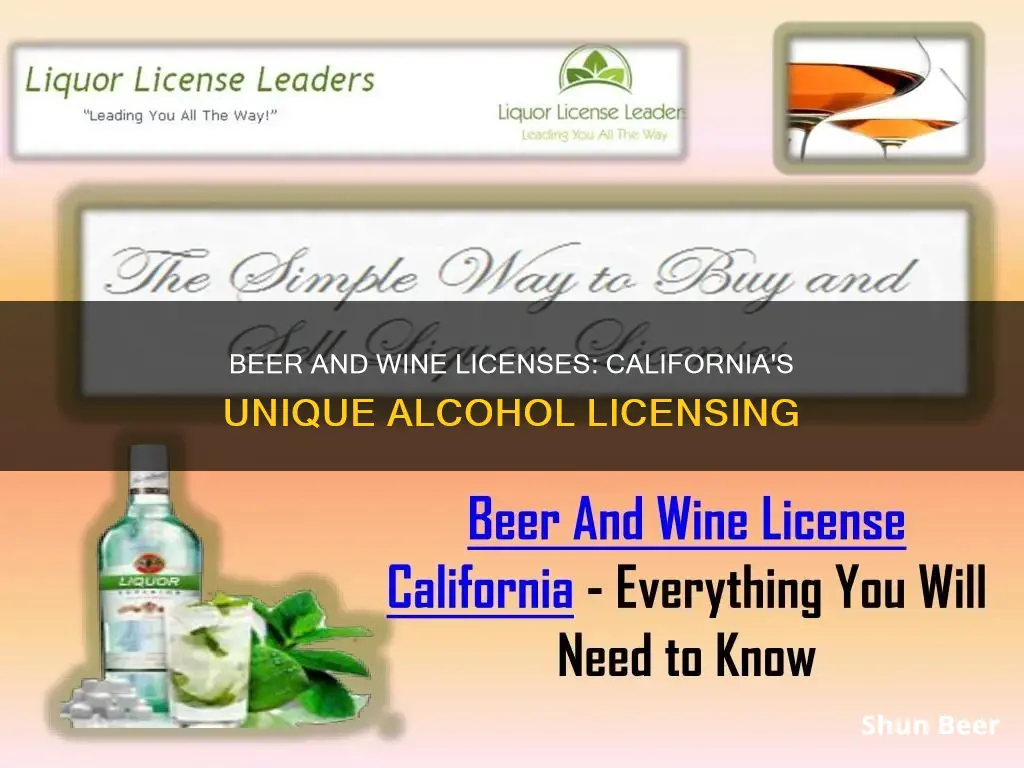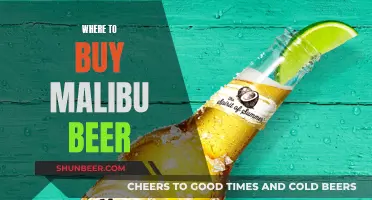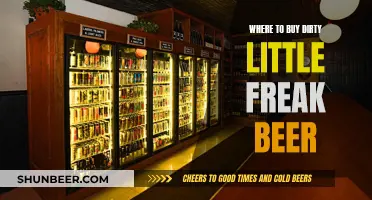
If you're looking to sell beer and wine in California, you'll need a liquor license. The process of obtaining one can be challenging, as licenses are limited and often need to be purchased from existing license holders. The type of license you need depends on the kind of business you run and the alcohol you intend to sell. For instance, if you're a bar or restaurant owner, you'll likely need an on-sale beer and wine license, which allows you to serve beer and wine for consumption on the premises.
The California Department of Alcoholic Beverage Control (ABC) oversees the licensing process, and there are several requirements you must meet to obtain a license. These include being over the age of 21, having a zoning permit, and not having a history of alcohol dependence or a disqualifying criminal record. The application process can be lengthy, often taking several months, and it's recommended that you work with a brokerage service to navigate the complexities.
| Characteristics | Values |
|---|---|
| License distributor | Department of Alcoholic Beverage Control |
| License types | On-sale beer and wine, Off-sale beer and wine, On-sale beer, On-sale general, Off-sale general |
| On-sale beer and wine license | Allows the sale of beer and wine for consumption on and off the premises |
| Off-sale beer and wine license | Allows the sale of beer and wine in sealed containers for consumption off-site |
| On-sale beer license | Allows the sale and consumption of beer on and off the premises |
| On-sale general license | Allows the sale of all types of alcoholic beverages for consumption on the premises and in sealed containers for consumption off the premises |
| Off-sale general license | Allows the sale of all types of alcoholic beverages in sealed containers for consumption off the premises |
| License requirements | Over the age of 21, proof of lease or ownership, zoning permit, no history of alcohol dependence, no disqualifying criminal record |
| License renewal period | 12 months |
| Renewal fee | Paid on or before the last day of the month posted on the license |
| Renewal license receipt | Approximately 4 to 6 weeks after the expiration date on the current license |
| License transfer | Person-to-person transfer, premise-to-premise transfer |
| Person-to-person transfer fee | $120 to $1,470 |
| Premise-to-premise transfer fee | $120 to $7,060 |
What You'll Learn

On-sale and off-sale licenses
On-Sale Licenses
On-sale licenses are required for businesses such as bars, restaurants, clubs, theaters, and museums. They are also necessary for establishments operating on transportation methods like planes, trains, and boats. An on-sale beer and wine license allows you to serve beer and wine on the premises for consumption on-site. The most common type of on-sale beer and wine license is the Type 41 license, which is intended for full-service eating establishments that offer beer and wine.
Off-Sale Licenses
Off-sale beer and wine licenses allow owners to sell sealed containers of beer and wine for consumption off-site. The most common type of off-sale beer and wine license is the Type 20 license, which is often sought by convenience and gas station owners. Off-sale licenses can also be used by importers, producers, or wholesalers of alcohol.
In addition to the standard off-sale beer and wine license, there is also a limited off-sale wine license, known as Type 85. This license is for sales of wine directly to consumers via the internet, direct mail, or telephone from a location that is not open to the public.
Buying Beer in Vegas: Supermarket Availability Explored
You may want to see also

On-sale beer license
An on-sale beer license in California allows the holder to sell beer for consumption on or off the premises of the establishment. This type of license is required for businesses such as bars, restaurants, clubs, theaters, and museums. It is also necessary for any establishment run on transportation methods like planes, trains, and boats.
To obtain an on-sale beer license, you must meet certain qualifications, including being over the age of 21, providing proof of lease or ownership of the venue, and obtaining a zoning permit known as a Conditional Use Permit (CUP). Additionally, you must not have a history of alcohol dependence or a criminal record that disqualifies you from holding a liquor license.
The application process for an on-sale beer license can be complicated and time-consuming. It is recommended to work with a brokerage service to navigate the process efficiently. The cost of an on-sale beer license can vary depending on market value, locality, and competition, ranging from a hundred dollars to thousands.
The on-sale beer license is a crucial permit for many California restaurants and bars, as it allows them to offer their customers the beverages they desire and can have a significant impact on their profits and overall success.
Trillium Beer: Where to Buy and What to Know
You may want to see also

On-sale beer and wine license
An on-sale beer and wine license is one of the most common types of liquor licenses in California. It allows proprietors to serve beer and wine to customers for consumption on the premises. It also permits the sale of sealed containers of beer and wine for consumption off-site. This type of license is typically sought by owners of restaurants, bars, clubs, theaters, and museums, as well as establishments operating on transportation methods such as planes, trains, and boats.
The on-sale beer and wine license is particularly relevant to restauranteurs and bar owners, as it enables them to provide their customers with the beverages they have come to expect, thus increasing profits and overall business success. Beer and wine have become integral to the dining experience, and alcohol sales often contribute significantly to a restaurant's revenue.
To obtain an on-sale beer and wine license in California, individuals must apply through the Department of Alcoholic Beverage Control (ABC). This process can be challenging due to the limited number of licenses available in the state. As a result, new business owners often need to purchase licenses from existing license holders, and prices can be high, especially in competitive areas. The application process is lengthy and requires meeting specific requirements, including age, proof of lease or ownership, a zoning permit, and a clean criminal record.
The cost of an on-sale beer and wine license varies depending on market value, locality, and competition. In some cases, licenses may be obtained for less than $100, while in other instances, they can cost thousands of dollars. Using a brokerage service can help individuals navigate the complex process and secure the best deal.
It is important to note that the on-sale beer and wine license is different from the off-sale beer and wine license, which only permits the sale of beer and wine in sealed containers for off-site consumption.
Angry Chair Beer: Where to Buy This Popular Brew
You may want to see also

Off-sale beer and wine license
An Off-Sale Beer and Wine license is one of the five basic types of liquor licenses in California. This type of license allows a proprietor to sell beer and wine in sealed containers for consumption off-site. Off-sale licenses are for businesses where customers do not drink on the premises, such as convenience stores, gas stations, and wholesalers. The most common type of Off-Sale Beer and Wine license is the Type 20 license.
To apply for an Off-Sale Beer and Wine license, you must be over the age of 21, have a zoning permit (known as a Conditional Use Permit or CUP), and be able to show proof of lease or ownership of the venue. You must also not have a history of alcohol dependence or a criminal record that disqualifies you from holding a liquor license.
The application process for an Off-Sale Beer and Wine license can be complicated and lengthy. It is recommended that applicants work with a brokerage service to help them navigate the process and secure the best deal. The process begins by contacting the nearest district office of the Department of Alcoholic Beverage Control (ABC). Staff members will ask questions about the proposed establishment and decide which type of license is needed. Applicants may also be required to acquire approval from zoning officials, open an escrow account, or obtain a copy of a Notice of Intended Transfer.
When filing an application, all parties must appear to provide personal information and pay the required fees. The applicant may also watch videos about liquor licensing laws and may receive a temporary permit. The ABC will then mail a copy of the application to local officials, including the police department, city planning department, and city council (if the establishment is within a city), or the sheriff's department, district attorney, and board of supervisors (if the establishment is in a county). This step could result in disputes, with local offices imposing restrictions on the business or filing a protest.
As an applicant, you must post the Public Notice of Application at the establishment for 30 days. You may also need to publish a notice in the newspaper, notify people living within a certain distance of the premises, and obtain proof from the local planning department that your zoning has been approved for a liquor license. If your application is contested, it will go to a hearing with all parties, including the ABC, present. Once the Administrative Law Judge makes their decision, you may choose to appeal.
The cost of an Off-Sale Beer and Wine license depends on various factors, including market value, locality, and competition. Application fees for non-general licenses, which include Off-Sale Beer and Wine licenses, range from $120 to $1,065. However, the overall cost of obtaining a liquor license can be much higher, with licenses in competitive counties and cities selling for upwards of a million dollars.
Thanksgiving Beer Run: Where to Buy Your Booze?
You may want to see also

On-sale general license
An on-sale general license is one of the most popular licenses for retailers, bars, and restaurants. It covers the sale of beer, wine, and distilled spirits for consumption on the premises of the establishment. This type of license also allows the proprietor to sell wine and beer in a sealed container for consumption off the premises.
The license is suitable for full-service restaurants, as it is incidental to food service. The business must have a kitchen, and all age groups are allowed on the premises.
The application fee for a non-priority on-sale general license is $1,065. The application process can take 55 to 65 days if the application is not contested by a third party. If the application is contested, it can take up to 175 days.
To apply for an on-sale general license, you must meet the following requirements:
- Location and zoning approval: Contact the appropriate county officials to inspect the location. If you are opening a business in a new location, you may need a Conditional Use Permit.
- Sales tax permit: Apply for and obtain a seller's permit for sales tax from the State Board of Equalization before requesting a liquor license.
- Federal requirements: Obtain a Federal basic permit or a special Occupational Tax Stamp, depending on your business type and location.
- Escrow requirements: If you are buying an existing business or transferring a license, establish an escrow for the full purchase amount. The escrow agreement must state that payment can only be completed after the license transfer is approved. Submit a formal notice to your local County Recorder as part of the transfer process.
Buying Beer in New York: Sunday Shopping Laws
You may want to see also







